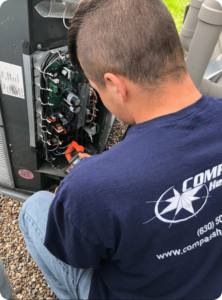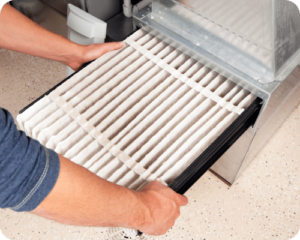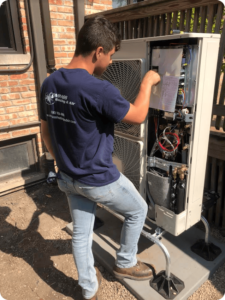Common Air Conditioning Problems and How to Fix Them
 Your air conditioning system is one of the most important components of your home. It keeps you cool and comfortable, no matter how hot it is outside. However, like any other mechanical system, they can run into problems and need some repairs and fixes every now and then. Understanding these common problems and their solutions can help you troubleshoot and maintain your AC system effectively, while also getting an idea of the costs associated with them.
Your air conditioning system is one of the most important components of your home. It keeps you cool and comfortable, no matter how hot it is outside. However, like any other mechanical system, they can run into problems and need some repairs and fixes every now and then. Understanding these common problems and their solutions can help you troubleshoot and maintain your AC system effectively, while also getting an idea of the costs associated with them.
We have been repairing and replacing air conditioners in South Barrington, IL, and the surrounding neighborhoods for over a decade. We’ve seen almost every problem there is, and know the solution to get your AC back up and running. In this article, we are going to explain some of the most common problems we see with air conditioners, and what the solution is to fix them!
If you are having problems with your air conditioner, give us a call at (630) 504-8688, or contact us online. We can come and take a look at your AC, and let you know what the best solution is to your cooling problem!
Refrigerant Leaks
Problem:
Refrigerant leaks are one of the most common issues we see with AC systems. The refrigerant is the substance that your air conditioner uses to create the cool air you pump into your home or office. When the refrigerant level is too low, usually due to a leak, the AC system cannot cool effectively.
A refrigerant leak in your AC can lead to increased energy consumption, higher utility bills, and reduced cooling efficiency.
Solution:
If you think that you have a refrigerant leak, contact an HVAC professional right away. Trained HVAC specialists will be able to locate and repair the leak, recharge the refrigerant to the correct levels, and ensure the system is running efficiently.
One of the biggest issues with this is the type of refrigerant you use. Over the years, R-22 was phased out, and now R-410A will become a scarce substance in 2025 and going forward. In an effort to reduce our impact on the environment, some of these more harmful refrigerants are being banned and phased out of production in the United States.
If you have an older system that uses one of these gasses, it may be a better idea to think about a replacement air conditioning system. The cost of these refrigerants are high, because they are not imported or produced in the U.S. anymore. They also are not as energy efficient as some of the new refrigerants, and the AC systems.
We recommend that you get a quote for a new system, and weigh it against a repair and recharge. It may be a better move to replace your AC in the long run.
Thermostat Sensor Issues
Problem:
The thermostat sensor is what measures your temperature, and determines if the AC needs to pump more air into the home. It is typically located near the evaporator coil. If the sensor is knocked out of position or malfunctions, it can cause the AC to cycle constantly or behave erratically. This is going to prevent it from cooling your space the way it should be, and could also run up your energy bills.
Solution:
To fix thermostat sensor issues, you should first check the position of the sensor. It should be near the coil but not touching it. If it has moved out of place, you can gently bend the wire that holds it in place to adjust it.
If this doesn’t fix your problem, the sensor might need to be replaced. If you continue to have problems, or just don’t feel comfortable adjusting the sensor yourself, give a professional a call. We deal with this kind of problem on a daily basis, and know exactly how to fix it with ease!
System Blowing Warm Air
Problem:
If your AC is blowing warm air, this is a clear sign that something is wrong! This problem can arise from various causes, such as a refrigerant leak, a malfunctioning compressor, or a simple issue like an incorrect thermostat setting. The point is, you have an AC that isn’t cooling, and you probably need the help of a professional to get it fixed!
Solution:
Start by checking the thermostat to ensure it’s set to “cool” and the fan is set to “auto.” If these settings are correct, the next step is to check the air filter. A clogged filter can restrict airflow, causing the system to overheat and blow warm air. Replacing a dirty filter can often solve this problem.
If the filter is not the issue, the problem might be more serious, such as a refrigerant leak or a compressor failure. In such cases, it’s best to call a professional AC technician to diagnose your system and repair the problem.
Clogged Filter
Problem: The air filter in your AC system is responsible for trapping dust, dirt, and other particles, preventing them from entering the system and being circulated in your home. Over time, the filter can become clogged with debris, reducing airflow and causing the system to work harder to maintain the desired temperature. This can lead to a bunch of different problems, including reduced cooling efficiency, increased energy consumption, and even system failure.
The air filter in your AC system is responsible for trapping dust, dirt, and other particles, preventing them from entering the system and being circulated in your home. Over time, the filter can become clogged with debris, reducing airflow and causing the system to work harder to maintain the desired temperature. This can lead to a bunch of different problems, including reduced cooling efficiency, increased energy consumption, and even system failure.
Solution:
The solution to a clogged filter is the easiest of them all. You replace it! Most AC filters should be replaced every one to three months, depending on how much you use your HVAC system, and the environment you live in. Homes with pets or people with allergies may need more frequent filter changes.
Regularly changing the filter is one of the simplest and most effective ways to keep your AC running efficiently and prolong its lifespan. It also keeps the air in your home cleaner and healthier to breathe!
Drainage Issues
Problem:
AC systems remove moisture from the air as they cool it, and this moisture is typically drained away through a condensate drain line. However, if this line becomes clogged or the pan is full, it can cause water to back up into the system, leading to leaks, water damage, and even mold growth.
Solution:
Luckily, this is a pretty easy fix. To resolve drainage issues, start by checking the condensate drain line for clogs. These lines can usually be cleared using a wet/dry vacuum to remove any blockages. If the drain pan is full, empty it and clean it to prevent mold and bacteria growth. It’s also important to ensure that the AC unit is properly leveled, as an uneven unit can cause drainage problems. If these steps don’t resolve the issue, give the pros a call to come take a look at your situation!
How AC Maintenance Helps Prevent AC Problems
The best way to avoid AC problems and get the most out of your system is with regular AC maintenance. By scheduling routine check-ups from an AC professional, you can keep your AC system running smoothly and efficiently, reducing the likelihood of unexpected breakdowns and needing repairs.
Importance of Regular Maintenance
 Regular maintenance will help you detect AC problems before they escalate into major issues. During a maintenance visit, an HVAC technician will inspect all the components of your AC system, including the refrigerant levels, thermostat, filters, and drainage system. They can also clean the evaporator and condenser coils, lubricate moving parts, and check the overall performance of the system.
Regular maintenance will help you detect AC problems before they escalate into major issues. During a maintenance visit, an HVAC technician will inspect all the components of your AC system, including the refrigerant levels, thermostat, filters, and drainage system. They can also clean the evaporator and condenser coils, lubricate moving parts, and check the overall performance of the system.
We recommend that you schedule regular air conditioning maintenance at least once a year.
Benefits of Preventive Maintenance
Here are some of the best benefits that AC maintenance has to offer:
- Increased Efficiency: Regular maintenance ensures that your AC system is operating efficiently, which can reduce the amount of energy you use, and lower your utility bills.
- Extended Lifespan: Your AC should last for 10+ years. We’ve seen some that last for 15-20 with proper maintenance. Regular AC service will keep the AC living longer than a system that is never maintained.
- Improved Air Quality:By cleaning all the components of your HVAC system, and also replacing the air filters, your air quality is going to improve. This is great for people with breathing problems, elderly, and young kids. It’s also just nice to breathe clean and healthy air!
- Cost Savings: Not only is regular maintenance going to help prevent breakdowns and AC issues, but it’s going to help save money. Fewer repairs, a longer lifespan, and lower energy bills are 3 big steps to reducing the financial impact of your AC system.
DIY AC Maintenance Tips
While there is no replacement for professional service, there are a few things you can do on your own to help maintain your air conditioner!
- Change the Air Filter: As mentioned earlier, replacing the air filter regularly is one of the easiest and most effective ways to maintain your AC system. This is something you can do on your own, and it’s not expensive at all.
- Clean the Coils: Dust and debris can accumulate on the evaporator and condenser coils, reducing their efficiency. Cleaning these coils regularly can help maintain optimal performance. We recommend using a hose and cleaning off the fan and coils inside every now and then.
- Inspect the Drain Line: Regularly check the condensate drain line for clogs and clear it as needed.
- Keep the Area Around the Unit Clear: Ensure that the area around your outdoor unit is free of debris, such as leaves, sticks, etc. which can obstruct airflow and reduce efficiency.
We hope that these problems and solutions can help you out if you are experiencing issues with your HVAC system. Hopefully, you don’t need to refer back to this article too much, and the AC is in good shape. If you are in need of some help with your air conditioner, give us a call or contact us online today!


